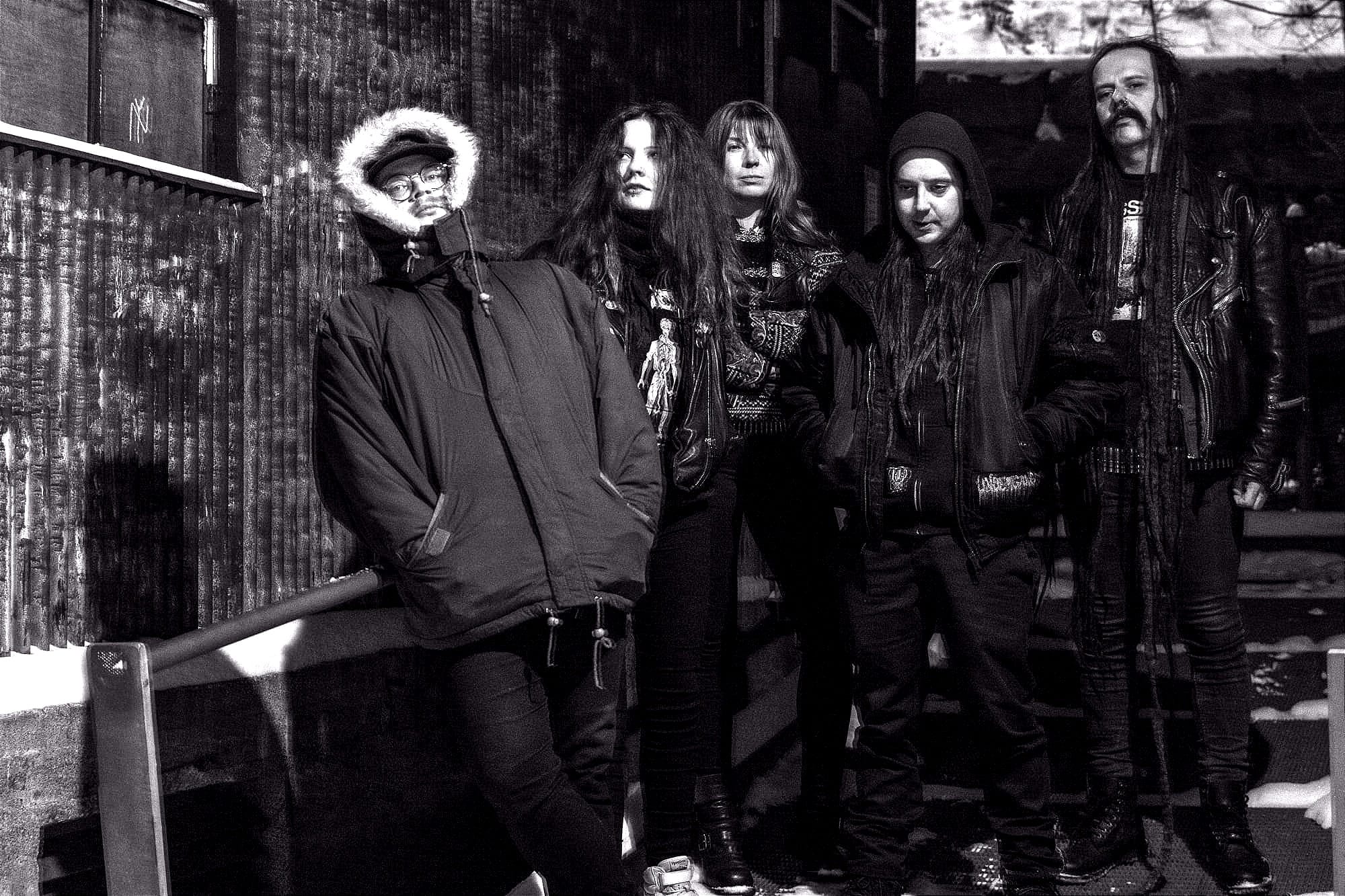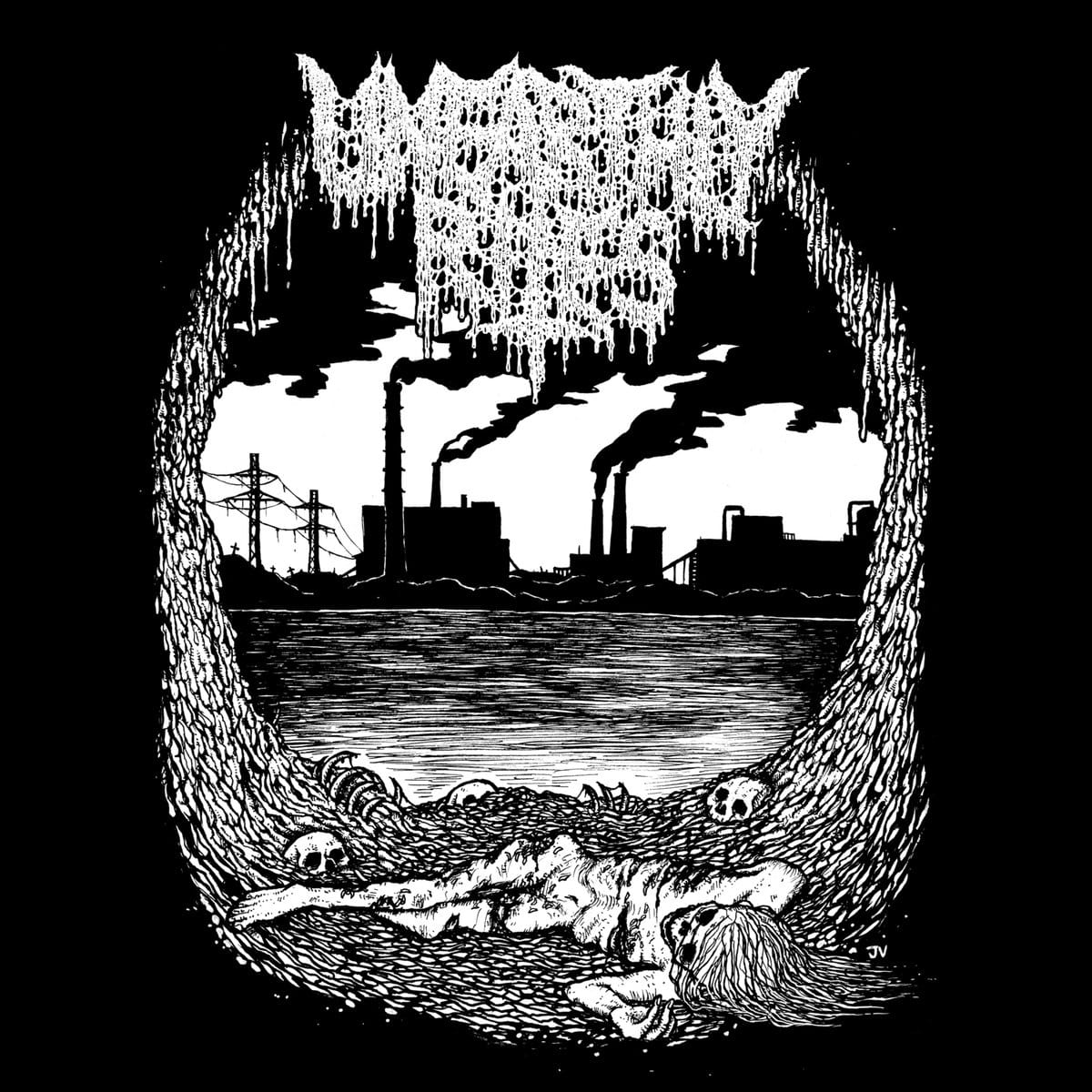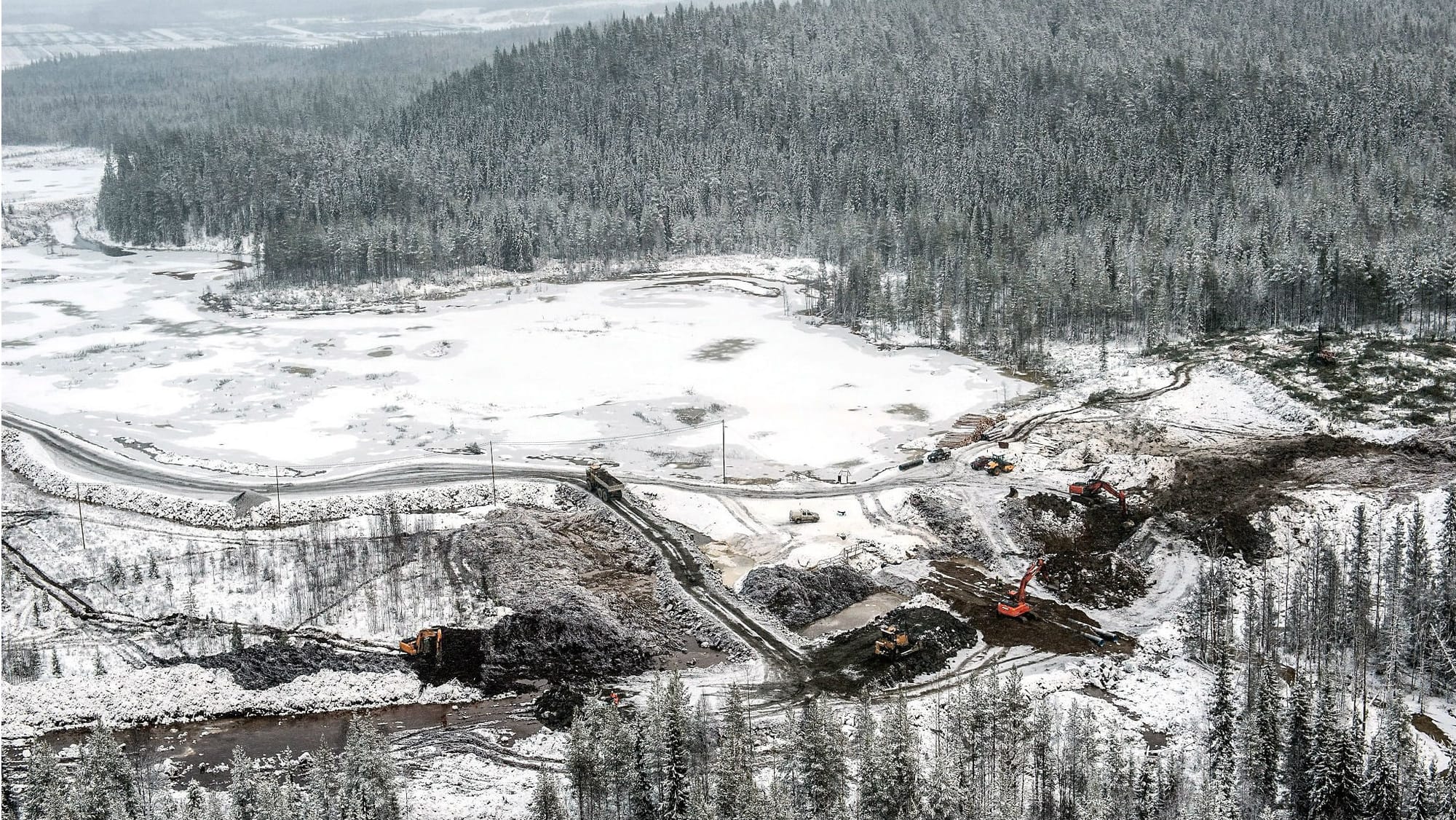Unearthly Rites Serve Up Eco-Friendly Arctic Aggression
These Finnish death metal punks hate greenwashing and heavy metal mining almost as much as they hate Nazis.

Finnish death metal has held its esteemed place in the metal pantheon for almost as long as I've been alive, so whenever a shit-hot new specimen emerges from Suomi's cities, swamps, or tundra, I know it's time to grab my headphones. When Unearthly Rites first crossed my radar, I assumed they'd be up my alley just from looking at them: black leather jackets, long hair, and stenchcore vibes are always a good indication that the band in question knows their way around both a d-beat and a crushing riff. Their Finnish location was yet another point in their favor—and Unearthly Rites certainly didn't disappoint.
Their take on metal of death is fairly straightforward, in that deliciously dark, convoluted Finnish way, and their punk influences are more aesthetic and conceptual than audible. Instead, their new album, Ecdysis, sees the five-piece scrape and crawl its way through a maze of mammoth riffs, distorted percussion, and hellish yowls, with the occasional shrieking solo slicing through the murk like a shard of sunlight in the darkness. It's a pummeling, morbid, mid-tempo morass, guaranteed to ensnare Bolt Thrower and Demigod alike (the appropriately titled album closer, "Doomed," is a particularly sludgy slab that will make Coffins fans salivate). Ecdysis itself is named after a word for rebirth—the shedding of an exoskeleton to grow a stronger, more beautiful new form. In other words, "we can bring to birth a new world from the ashes of the old."
It's not all doom and gloom, and the album's other song titles and lyrics also deserve a closer look. I've become a big lyrics guy over the past few years, and always keep an eye out for unique or surprising lyrical themes. It's not often we see sentiments like "Fuck Ecofascism" or "Deep Drilling Earth's Crust" anchoring a death metal album this gnarly, and I was immediately intrigued.

While I can appreciate regurgitated guts as much as the next girl, Unearthly Rites' focus on endemic capitalist exploitation and environmental issues, specifically in Finland's Arctic mining industry, was far too fascinating to pass up (and, again, right up my alley—I could swear that this album was engineered in a lab specifically for me if the band members themselves weren't already involved in so many other projects).
I'm far from the only one who sees something special in Unearthly Rites. Their gritty 2021 self-titled debut EP was released on a series of limited cassette runs but made enough of a splash to attract attention from several labels. They weighed their options carefully, as any brand-new band should, but ultimately the decision was an easy one to make. "Our band found Prosthetic Records to be the best match for us to gather more audience and visibility for our ideas and music," Sisli explained.
It's been a good home for them so far, and thanks to its open embrace of leftist metal artists like Dawn Ray'd, Vile Creature, and many others, the U.S.-based label can offer the band access to the exact audience they're hoping to reach. Ecdysis ended up dropping on May 3, 2024—as close to May Day (a.k.a. International Workers Day) as the current new music release conventions allow.
Amid all the excitement, I got to chat with vocalist Sisli about the band's new record, their stance on heavy metal mines, and freezing out fascists (and fair warning: in my other mode as a labor journalist, I've done a lot of reporting on coal miners and mining communities in the rural U.S. as well as mining's impact on public health and the local environment, so we fully nerded out on this one!). Read on for a lightly edited transcript of our conversation, and to stream Ecdysis in full!

SALVO: Finland is viewed from the outside as a socially advanced, environmentally friendly country, but there is surely more going on beneath the surface. What are the kinds of issues Finland's people face? How does the government relate to its residents?
SISLI: I guess Finland can be seen as a socially advanced and environmentally friendly country from afar. And of course, Finland is part of the privileged global North that owes its well-being to the global South. The climate debt we have is huge and it seems that no one is interested to talk about it nor to pay it.
Finnish society offers basically equality of opportunity. This recognizes weakly, e.g. generational poverty, displaced and marginalized groups. Social work and health-care related issues have been wrecked in recent years and this can unfortunately be seen in a sharp rise in overdose death rates, mental health issues, child welfare issues, etc.
And about the environmental-friendliness… Finns do have Everyone’s Rights, which means that we have access to nature and everyone can, for example, gather berries and pick mushrooms. This means that many feel somewhat connected with nature. Unfortunately, this does not equal respect; instead nature is seen as a resource to be extracted & exploited one way or the other. The majority of our forests are actually just monoculture plantations. Many of our waterways are polluted by forestry, the pulp/paper industry, open-pit mining, and agriculture. The water power dams destroyed our salmon rivers.
Now the green transition is introduced as our only solution for the climate crisis, which seems to mean we should sacrifice the last strips of old-growth forests and high-biodiversity areas, and that we should risk our waterways to fast-track open-pit mining for the battery industry. The means introduced as "green transition" are in general very area-intensive and that creates conflicts of interest. Wind and solar energy are taking more and more forest land as well.
We need some renewable energy, but the solutions introduced are again highly capitalist industry-level implementation instead of community-led projects for energy self-sufficiency. Also, it should be noted that all of the land use is taking area away from somewhere, leading to habitat fragmentation and damage to biodiversity. Already every ninth species in Finland is endangered, and the majority of them are old-growth forest dependents.
The Arctic nature is also threatened by the climate crisis, as Arctic areas warm three times faster than the rest of the world. Living in the Arctic we can already see how this is shaping the environment negatively. Unfortunately, the current Finnish government is halting all of the climate action and nature conservation actions we have previously agreed to, so the future looks rather dystopian.
People in the U.S. look to Nordic countries like Finland as this utopian ideal because our country is such a nightmare in terms of inequality, the housing crisis, the increasingly fascist government, and so on... but it's clearly not perfect there, either. How do the brutalities of capitalism manifest in a country like Finland?
Finland was rated again the happiest country in the world. It’s also an extremely individualist country with rather high depression and suicide rates.
At the moment we have a right-wing government that is trying to introduce a national border protection legislation that they themselves acknowledge goes against the UN's Universal Declaration of Human Rights. Finland is also one of the most racist countries in the EU. In the summer of 2023, our freshly-elected minister resigned over Nazi references; the political scandal came as no surprise to Finns, although it maybe was that for the rest of the world. Already before we have had a lot of issues with migration politics and the racist tendencies of the police and other officials. It should also be mentioned that colonialist attitudes against the Sámi people continue (Sámi are the only indigenous people in Europe; their homeland Sápmi spans across the borders of Finland, Sweden, Norway and Russia).
So, at the moment I would say that the brutalities of capitalism manifest at its worst against migrants, displaced people and ethnic minorities.
It's very cool to come across an Audre Lorde quote in a death metal band's lyrics. What are your collective inspirations behind this project? What other writers and activists have inspired you as you've put this record together?
Hahaha, glad to hear as I thought maybe it’s already a bit worn-out to quote them! Our band’s collective inspiration in a nutshell is probably just to play killer death metal with a DIY punk attitude in the core. We all also share a commitment of antiracist and antifascist ideals.
I have been reading quite a lot of theory on extractivism lately. Also the concept of capitalocene, a term suggested by Donna Haraway and others as the geological term instead of “anthropocene” feels to me relevant. It leads us to the power relations in play that have caused this disaster.
Globally, I am interested especially in indigenous-led environmental movements from the perspective of an ally and a learner. Locally, I have a lot of appreciation for the past and present environmental & social justice activists and campaigns in the Arctic north. The people who have stood up for decades without much support, as the areas are sparsely populated and in many cases there has been a lot of pressure from the community against the activism. At the moment in Finland, there are also many influential activist groups, such as Metsäliike (forest action to save old-growth forests) and Elokapina (the local branch for Extinction Rebellion). Also the anti-authoritarian movement has had a strong impact on my thinking. And of course the hard facts, such as the planetary boundaries. They should be the base rule for all of our actions. At the moment we are exceeding several of them.
The lyrics span a lot from the daily frustration with our society; the collective denial to keep the status quo; the endless greenwashing of extractivism and ecocide; justifying it with the environmental and social conflicts the mining industry has caused in the global South. Even if we dug up all the minerals, it would not solve this shit. It is a known fact that all of the currently known mineral deposits would not be enough for fossil-free infrastructure—so if we are not going for the root cause, i.e. the Global North’s over-consumption, our societies will collapse and we should prepare for that scenario as well. We should move on beyond hope and the false solutions offered.
I know that it's not just conceptual for you, either; you're an environmental activist yourself. I'd love to hear more about the kind of campaigns you've been involved in.
I am mostly involved in the anti-mining movement in the Arctic north. There are several campaigns running with different focuses. Most of them are in protection of specific areas in different parts of the Arctic in Finland/Finnish Sápmi. Also we have a joint mining-critical environmental movement that brings together different local movements, and a couple of environmental/nature conservation NGOs. The activism can be everything from demonstrations to media work and lobbying. There are not many of us, but working together gives us all strength.
I’m not sure if I’ll regret all the time and resources spent on this when I’m old. Some time ago I interviewed an activist woman that I have idolized for a long time. She fought for 40 years against a huge water power dam project as she wanted to preserve one waterway and its surrounding mires and forests in her home village. She even received death threats for her actions. And in the end, she won. But she still had a strong feeling that she had wasted all those years, as the destruction of nature just continues. Now mining companies are deep drilling in the same area. The battles are endless and the wins are mostly temporary, but the losses may be permanent.

I've done a lot of reporting on coal mines here in the U.S. and I know that Finland's main mining concerns are gold and chrome. What can you tell me about the conditions those workers face and the impact it has on the local environment and surrounding communities?
Heavy metals, I know you are into this subject! You are right, there’s a lot of metal mines in Finland and they are also of interest in many of the current mining projects. Also there’s a fast-growing interest in minerals needed for the so-called green transition, some of them have been coined together as critical minerals (the EU's Critical Raw Materials Act was just lobbied against by the mining industry).
The workers’ conditions in Finland are better than in many other countries, as the work legislation is quite strict and obeyed. One death case in 10 years, some court cases concerning workers’ safety in asbestos work and unpaid hazardous duty pay. The main problem with the mining industry is its impact on the local environment and the community.
The mining company begins by corrupting the local villages by investing in youth sports clubs and other activities that can be used to gain acceptance, offering jobs and promises of new infrastructure. Compared to other countries like Canada, the communities don’t really benefit at all from the mine—it’s breadcrumbs.
The permitting processes are led by officials with ties to the mining industry. The companies also act without any permits. As an example, in the Kittilä gold mine, Agnico Eagle built 20 kilometers of illegal wastewater pipe and then pressured the officials, saying that they’d have to lay off the workers if they didn't get the permit.
A mine is like an open wound that will continue to bleed for centuries. It is not a temporary change after which nature will return. It destroys the area permanently. The majority of mines in Finland are sulfide-ore mines, which means that acid mine drainage is formed, leaching heavy metals that pollute surface water and groundwater. In ancient mines from Roman times, the drainage is still continuing after 2000 years. That should give some perspective.
The emissions, noise and transport from the mine deteriorate or even destroy jobs that are dependent on nature. Reindeer herding has been a traditional occupation in the Arctic north for hundreds of years. It is affected by all forms of increasing land use, as the reindeer are semi-domesticated animals that range freely all year round in the forests. Nature tourism can at its best be a sustainable way to use nature and its demand is rising, but tourism just cannot succeed next to a mine. The mines have operating times of 10-25 years, after which the area is left damaged and without any jobs.

Norway's shutting down its last coal mine in 2025, but Finland's mineral mining doesn't seem to be slowing down; is there any official plan in place to stop mining in Finland? Are workers and environmental activists pushing for a transition away from these metals, like in the U.S.?
There’s an official plan to bring more mines to Finland. The mining industry is lobbying heavily and there are all kinds of EU-funded projects on greenwashing the mining industry, i.e. on “sustainable mining.” Mining can never be sustainable, it is an extractive industry. But this especially applies to Finland, with a lot of low-concentration metal open-pit mines due to the vast network of forest roads that gives easy access close to the mineral deposits, and weak permitting processes, legislation, and a ridiculously small mining tax.
This is the main reason for several environmental conflicts and long-term contamination of waterways. There are now more activists who are involved in the anti-mining movement, and we have sent several citizens’ initiatives (with 50,000 people needed for each) to the Finnish Parliament, but it hasn’t changed much. The pressure is building up because of the climate crisis, so the future remains unsure.
There's a very strong death metal tradition in Finland, but you personally come from the punk scene. I've always thought that the best metal bands were made up of punks, and Unearthly Rites proves me right here. What appeals to you about the old-school death metal sound?
Well, what doesn’t? It’s just bloody good music. And the death metal scene and punk scene have always had a bit of overlap, we have all been fans of old school death metal for a long time, so I guess it was just something that felt good and inspirational.
Finland's metal scene is also unfortunately home to a number of NSBM bands. What kind of anti-fascist resistance is happening within the Finnish extreme metal world? How do you combat the fascist creep? And, what strategies can you share with others who want to keep Nazis out of their own metal scenes?
In the past years there was a lot of anti-fascist resistance concerning NSBM. An antifascist group called Varisverkosto published information on the NSBM scene and on the Nazi ties of different actors, causing also some gigs to be canceled and of course a lot of speculation and drama in the social media. I’m not sure if this anti-NSBM project is on halt, at least I haven’t come across their news lately. I think the project received a lot of criticism from the extreme metal scene, as gig organizing is considered risky and hard work, and well, of course, the gig organizers also have social capital and power.
Still, it seems that in the long run it also made people more informed that NSBM has serious connections with the fascist movement, it’s not just some edgy thing that you do after Satan is not considered provocative enough anymore. And I guess it marginalized NSBM again so that nowadays all of the Nazis are playing together at their own festivals and at the one and only bar that allows them to play.
And for combating the fascist creep, I think people have moved from public call-outs to more informal strategies, like private chats like, “Why is your band throwing a gig in that bar as everyone knows it hosts Nazi events.” In Finnish society, there’s a strong fear of being publicly judged or losing one’s credibility in the eyes of others. So I guess it’s easier to have a face-to-face talk and explain why playing with Nazi bands at a Nazi venue is far from apolitical.
Of course, there are different approaches and tactics, I think it was in 2020 when this Nazi bar owner’s cars were torched by some anarchist antifascists. I noted today that the same venue is hosting again a Nazi crossover festival with RAC, NSBM etc. And today it was also on the news that someone had thrown Molotov cocktails at a mosque that just happens to be located in the same area as the bar. So if we were talking about how to end that shit from happening, well, that hasn’t been successful yet.
I’m not sure which strategies work the best. The apolitical tendencies are strong in the Finnish extreme metal scene. People still stick to the false idea that freedom of speech means also the right to hate speech and downright fascism. Many are also afraid of claiming any position, thinking that antifascism is something so radical they want nothing to do with it.
At the moment in the DIY punk/metal scene, there are again a lot of crossover lineups, hosting both hardcore and death/black metal bands during the same night, and at least in the Helsinki area many of them are at an all-ages venue. When you organize the stuff yourself, you can decide on the bands and influence people. Often the flyers and posters are with the simple slogan “natsit vittuun” (fuck off nazis). That is one good strategy for sure.
Hell yeah. Any last thoughts?
Our band strongly recommends everyone to listen to not only our upcoming album, but also Tunkio, a sick grindcore band from Jyväskylä, Finland!!! Thanks for the interview, keep up the good work!
+
Ecdysis is out now on Prosthetic Records—go give it a listen, and don't forget to subscribe to Salvo!



